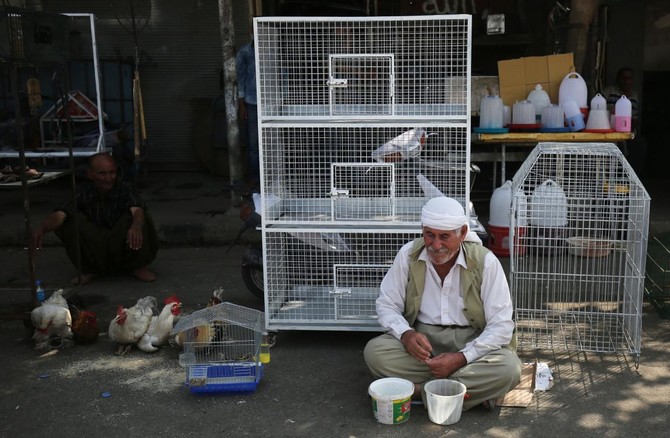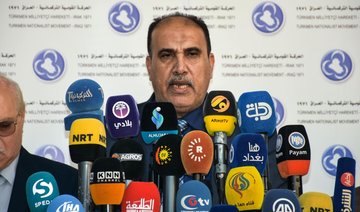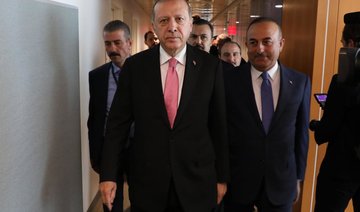KIRKUK, IRAQ: Visitors to Kirkuk in northern Iraq are greeted by an imposing statue of a Kurdish Peshmerga fighter with a gun slung over his shoulder, a reminder of tensions building in the hotly-contested city ahead of a referendum on Kurdish independence.
Erected in July, the statue has come to symbolize how the Kurds want to cement their hold on oil-rich Kirkuk and other parts of the region by holding next Monday’s vote. Peshmerga, which means those who confront death, are the military forces of the autonomous region of Iraqi Kurdistan.
The referendum is risky, especially in Kirkuk, a multi-ethnic city also claimed by Arabs since oil was discovered there in the 1930s. The Kurdistan region produces around 600,000 barrels per day (bpd) of oil.
The central government in Baghdad, Iraq’s neighbors and Western powers fear the vote could divide the country and spark a wider regional conflict, after Arabs and Kurds cooperated to dislodge Daesh from its stronghold in Mosul.
Already at least one Kurd has been killed in pre-referendum clashes, and security checkpoints have been erected across the city to prevent further violence.
But the Kurds say they are determined to go ahead with the vote, which, though non-binding, could trigger the process of separation in a country already divided along sectarian and ethnic lines. Iran, Turkey, the United States and Western allies oppose the vote.
Some non-Kurds fear Baghdad will attempt to regain control of Kirkuk and send in Shiite militias (PMU), also known as the Hashid Al-Shaabi, stationed just outside the province.
“I fear the Hashid will come and fighting will start in Kirkuk,” said Nazim Mohammed, an Arab from Mosul who fled to Kirkuk when the northern city was overrun by Daesh.
Backed by Iran, the militias fear an independent Kurdistan would split Iraq, giving them and Tehran less influence.
Kirkuk, populated by Kurds, Arabs, Turkmen, Christians and other minorities, is one of 15 ethnically mixed areas in northern Iraq that will participate in the referendum. They are claimed by both the central government in Baghdad and the Kurdistan Regional Government(KRG).
A decision by KRG President Massoud Barzani to include these so-called disputed territories in the plebiscite was widely interpreted as a unilateral move to consolidate Kurdish control.
Critics say Kurdish intentions were already clear before the referendum was announced. Peshmerga fighters seized Kirkuk in 2014, after fleeing Iraqi security forces left its oil fields vulnerable to Daesh militants who had just swept across northern Iraq.
The statue is dedicated to the Peshmerga and is designed to represent the appreciation of the people of Kirkuk.
Kurds mark out territory
Tensions between the KRG and Baghdad are not new, and hinge on oil revenue. The Kurds have long accused Baghdad of failing to make budget payments to the region, while central government has opposed oil deals made by the Kurds without its consent.
Nevertheless, the Kurds have been marking their territory in the run-up to the vote. Peshmerga outposts dot the area, protecting the flaming oil fields on Kirkuk’s outskirts. Kurdish flags have been hoisted across the city since the spring, and now fly alongside Iraqi flags on government buildings.
Dreaming of long-denied statehood since World War One, the Kurds say the are ready to fight if necessary. “Kurdistan’s land belongs to the Kurdish people,” Kemal Al-Kirkuki, the Kurdish military commander responsible for the front-line against Daesh, told Reuters at his base in Dibis.
“No one, not the PMU, has the right to take it ... We will ask them to leave Kurdish territory, peacefully. But we are prepared to fight if we need to.”
On Monday, clashes broke out in Kirkuk after a Kurdish convoy celebrating the referendum drove by a Turkmen political party’s office. A Kurd was killed, and two others were injured, security sources said.
This followed a week of escalating rhetoric between the Kurdish leadership and Baghdad, where parliament voted to reject the referendum and oust Kirkuk’s Kurdish governor, Najmaddin Kareem.
The conflict over the disputed territories is bitter. If the Kurdistan region of Iraq declared a break-off from Baghdad, Kirkuk would fall right on the border between the two. Kirkuk produces around one quarter of the region’s oil.
“If the Kurds want to press for a separation of sorts,” said Joost Hiltermann, MENA program director at the International Crisis Group, “the boundary question becomes critically important.”
“If Baghdad and Erbil continue to take unilateral steps,” he said, “things can only escalate.”
There are no reliable statistics on Kirkuk’s population, where both Kurds and Arabs say they have a demographic majority; vital to legitimize their respective claims over the province.
Returning kurds
Kirkuk was meant to have a census under the 2005 constitution, drafted two years after former Iraqi leader Saddam was toppled in the US-led invasion, but it did not take place because of the risk of ethnic and religious tensions.
During Saddam’s Anfal campaign waged against the Kurds in the 1980s, there was a forced “Arabization” of disputed areas, which ejected Kurds from the province. Arabs from other parts of Iraq were then settled, taking over Kurdish homes and businesses.
In 1988, Saddam caused international outrage by staging a chemical attack on the Kurdish city of Halabja which killed thousands of people.
Many Arabs have been ousted since Saddam was toppled in 2003, emboldening the Kurds to reclaim large parts of the disputed territories, including Kirkuk. Displaced Kurds were provided with incentives to return, while Kurds from other areas were also moved in, angering other minorities.
“Since 2003 some 600,000 Kurds have arrived, many of them are here illegally,” said Ali Mehdi Sadiq, a Turkman member of Kirkuk’s local council. “Without dialogue everything is possible. We need to avoid a war engulfing the whole of Iraq.”
“Nothing comes without a price”
He blamed Governor Kareem, a Kurd who lived for more than 30 years in the United States for what he called a Kurdish discrimination of minorities.
The governor said the Kurds would guarantee minorities’ rights, pointing to relative stability in the Kurdistan region in contrast to Baghdad where suicide bombings are frequent.
But his support for Kurdish independence is worrying minorities: he refused to sit behind an Iraqi flag during an interview, preferring the Kurdish one and said he would destroy his Iraqi passport the minute he got a Kurdish one.
He shrugged off the decision by Iraq’s parliament last week to sack him as “unlawful,” adding: “This is a proud day for me.”
Anticipating trouble ahead, some residents of Kirkuk have been stockpiling basic foods such as flour, rice and milk.
“Since they announced the referendum I have hardly had any customers. The market is dead,” said 27-year-old Ali Hamza, an Arab who has a small textiles shop in the old city.
Several Kurds interviewed supported the independence vote but privately said they were worried about clashes afterwards.
But faced with his people’s fears of clashes and economic problems, Governor Kareem said that when taking a big step like the referendum, “anything was possible.”
“Nothing comes without a price.”



























